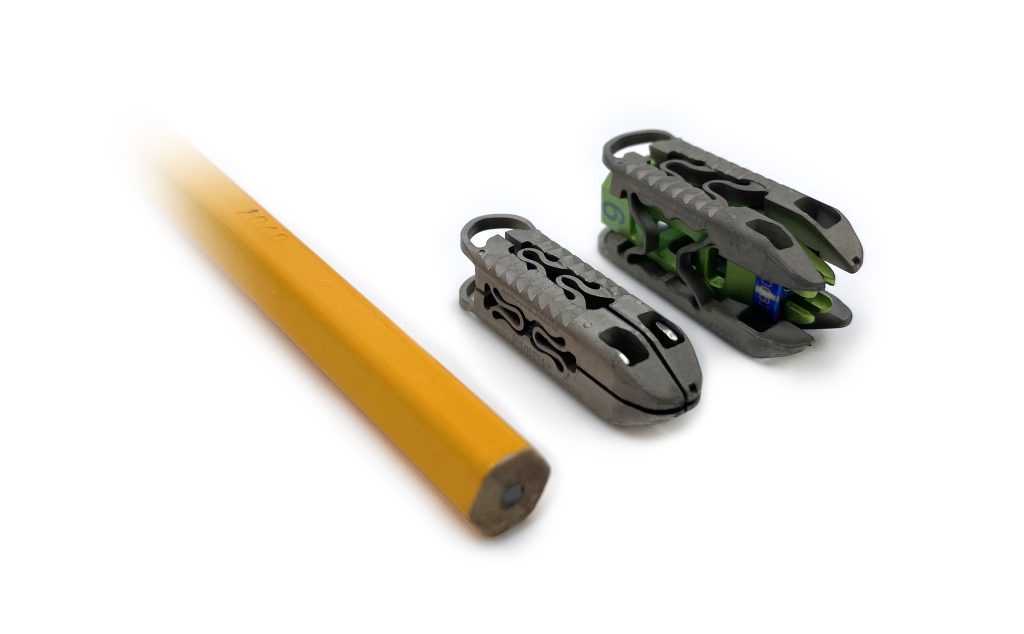TiHawk7 combines ultra-low 7mm insertion profile with strong titanium/PEEK adhesion while still allowing for radiographic verification of fusion

PALM BEACH GARDENS, Fla., May 5, 2022 (GLOBE NEWSWIRE) – Accelus, a medical technology company focused on accelerating the adoption of minimally invasive surgery (MIS) as the standard of care in spine, today announced the alpha launch and first procedures performed utilizing its TiHawk7™ expandable interbody cage. TiHawk7 is the latest addition to Accelus’s FlareHawk® Interbody Fusion System portfolio of spinal fusion cages and features a new ultra-low profile with titanium at the bony interface.
“TiHawk7 encompasses all of the implant advantages needed to make MIS spine procedures successful: an ultra-low insertion profile with multidirectional interbody expansion combined with the benefits of an innovative titanium and PEEK bonding process,” said Chris Walsh, CEO and Co-founder of Accelus. “Our titanium is deposited in a thin, uniform layer at the bony interface in a manner that does not inhibit the favorable properties of PEEK. This allows for easy radiographic visualization for implant placement and fusion assessment while providing for a modulus more similar to bone.”
The first TiHawk7 procedure was performed by Dr. Micah Smith, an orthopedic surgery specialist with Ortho NorthEast in Fort Wayne, Ind. The two-level, percutaneous minimally invasive transforaminal lumbar interbody fusion (TLIF) procedure was completed with excellent results.
“I’ve performed several cases with the TiHawk7 to date and am very impressed with the endplate conformity of the interbody device, as well as the large amount of bone graft I am able to get in and around it,” said Dr. Smith. “I’m able to observe all of this radiographically through the TiHawk shell, which isn’t possible with other titanium expandable implants.”
TiHawk7 brings together the distinct advantages of the existing FlareHawk portfolio and Accelus’s Adaptive Geometry™ technology. Similar to other FlareHawk devices, TiHawk7 brings together an open-architecture design that allows for maximum graft delivery in and through the cage with the ability for the cage to conform to patients’ endplate topography1. The device also boasts an ultra-low insertion profile of 7mm tall x 7mm wide, which is similar in size to a No. 2 pencil, and expands to form a 12mm tall x 11mm wide interbody footprint.
Dr. Samuel Joseph, a fellowship-trained, board-certified orthopedic surgeon and founder of the Joseph Spine Institute, also performed an endoscopically assisted, multilevel TLIF with TiHawk7, commenting, “TiHawk7 adds a new level of confidence to my minimally invasive procedures with its innovative application of titanium while reducing the risk of subsidence, delamination, or implant failure. I was able to perform the multilevel procedure endoscopically in three hours. The patient was sent home the day after surgery and is recovering well.”
TiHawk7 also features innovative instrumentation that allows for both comprehensive disc prep and direct visualization of the disc prep for endoscopically assisted TLIF procedures. This allows surgeons to access the disc space through Kambin’s triangle to minimize the need for neural retraction and help preserve the patient’s normal anatomy.
About FlareHawk Expandable Lumbar Interbody Fusion System
The FlareHawk Interbody Fusion System is indicated for spinal intervertebral body fusion with autogenous bone graft and/or allogeneic bone graft composed of cancellous and/or corticocancellous bone in skeletally mature individuals with degenerative disc disease (DDD) at one or two contiguous levels from L2 to S1, following discectomy. DDD is defined as discogenic back pain with degeneration of the disc confirmed by history and radiographic studies. These patients should have at least six (6) months of non-operative treatment. Additionally, these patients may have up to Grade 1 spondylolisthesis or retrolisthesis at the involved level(s). FlareHawk system spacers are intended to be used with supplemental fixation instrumentation, which has been cleared for use in the lumbar spine.
About Accelus
Accelus is a medical technology company dedicated to advancing spinal surgery treatment options by developing and commercializing an ecosystem of enabling technologies, including a proprietary surgical robotic targeting and navigation platform and differentiated implant systems. Accelus offers an innovative portfolio of implants, instruments, biologics and technologies that address the clinical challenges associated with spine surgery, with a focus on minimally invasive surgery (“MIS”) techniques and solutions. Their first-of-its-kind FlareHawk Interbody Fusion System (“FlareHawk”) features proprietary multidirectional expansion technology, designed for minimal disruption to the patient’s anatomy during insertion and natural load distribution and support. Accelus also offers a revolutionary Robotic Enabled Minimally Invasive (“Remi”) robotic targeting and navigation platform, which provides an efficient and economically accessible solution to a broad array of spine surgeons. The novel portfolio of implants and instruments, paired with the revolutionary robotic targeting and navigation platform, is designed to address the limitations associated with MIS procedures while providing broader access to enabling technologies for alternative facilities, such as ambulatory surgery centers (“ASCs”). Learn more at www.accelusinc.com.
1. Cheng BC, Swink I, Yusufbekov R, Birgelen Michele, Ferrara L, Coric D. Current Concepts of Contemporary Expandable Lumbar Interbody Fusion Cage Designs, Part 2: Feasibility Assessment of an Endplate Conforming Bidirectional Expandable Interbody Cage. International Journal of Spine Surgery. https://www.ijssurgery.com/content/14/s3/S68. Published December 1, 2020.
# # #


